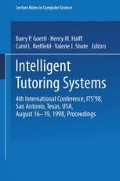Abstract
The PACT Geometry tutor has been designed, with guidance from mathematics educators, to be an integrated part of a complete, new-standards-oriented course for highschool geometry. We conducted a formative evaluation of the third “geometric properties” lesson and saw significant student learning gains. We also found that students were better able to provide numerical answers to problems than to articulate the reasons that are presumably involved in finding these answers. This suggests that students may provide answers using superficial (and possibly unreliable) visual associations rather than reason logically from definitions and conjectures. To combat this type of shallow learning, we are developing a new version of the tutor’s third lesson, aimed at getting students to reason more deliberately with definitions and theorems as they work on geometry problems. In the new version, students are required to state a reason for their answers, which they can select from a Glossary of geometry definitions and theorems. We will conduct an experiment to test whether providing tutoring on reasoning will transfer to better performance on answer giving.
Access this chapter
Tax calculation will be finalised at checkout
Purchases are for personal use only
Preview
Unable to display preview. Download preview PDF.
References
Anderson, J. R., 1993. Rules of the Mind. Hillsdale, NJ: Addison-Wesley.
Anderson, J. R., A. T. Corbett, K. R. Koedinger, and R. Pelletier, 1995. Cognitive tutors: Lessons learned. The Journal of the Learning Sciences, 4,167–207.
Anderson, J. R., and R. Pelletier, 1991. A development system for model-tracing tutors. In Proceedings of the International Conference of the Learning Sciences, 1–8. Evanston, IL.
Burton, R. R., and J. S. Brown, 1982. An Investigation of Computer Coaching for Informal Learning Activities. In D. H. Sleeman and J. S. Brown (eds.), Intelligent Tutoring Systems, 79–98. New York: Academic Press.
Chi, M. T. H., P. J. Feltovich, and R. Glaser, 1981. Categorization and representation of physics problems by experts and novices. Cognitive Science, 5, 121–152.
Corbett, A. T., and J. R. Anderson, 1995. Knowledge tracing: Modeling the acquisition of procedural knowledge. User Modeling and User-Adapted Interaction, 4: 253–278.
Holland, J. H., K. J. Holyoak, R. E. Nisbett, and P. R. Thagard, 1986. Induction: Processes of Inference, Learning, and Discovery. Cambridge, MA: The MIT Press.
Koedinger, K. R., and J. R. Anderson, 1990. Abstract planning and perceptual chunks: Elements of expertise in geometry. Cognitive Science, 14, 511–550.
Koedinger, K. R., and J. R. Anderson, 1993. Reifying implicit planning in geometry. In S. Lajoie and S. Derry (eds.), Computers as Cognitive Tools, 15–45. Hillsdale, NJ: Erlbaum.
Miller, C. S., J. F. Lehman, and K. R. Koedinger, 1997. Goals and learning in microworlds. Submitted to Cognitive Science.
NCTM, 1989. Curriculum and Evaluation Standards for School Mathematics. National Council of Teachers of Mathematics. Reston, VA: The Council.
Paivio, A., 1971. Imagery and verbal processes. New York: Holt, Rinehart, and Winston.
Ritter, S., and K. R. Koedinger, 1997. An architecture for plug-in tutoring agents. Journal of Artificial Intelligence in Education, 7(3/4), 315–347. Charlottesville, VA: AACE.
Ritter, S., and J. R. Anderson, 1995. Calculation and strategy in the equation solving tutor. In Proceedings of the Seventeenth Annual Conference of the Cognitive Science Society, 413–418. Hillsdale, NJ: Erlbaum.
Author information
Authors and Affiliations
Editor information
Editors and Affiliations
Rights and permissions
Copyright information
© 1998 Springer-Verlag Berlin Heidelberg
About this paper
Cite this paper
Aleven, V., Koedinger, K.R., Colleen Sinclair, H., Snyder, J. (1998). Combatting Shallow Learning in a Tutor for Geometry Problem Solving. In: Goettl, B.P., Halff, H.M., Redfield, C.L., Shute, V.J. (eds) Intelligent Tutoring Systems. ITS 1998. Lecture Notes in Computer Science, vol 1452. Springer, Berlin, Heidelberg. https://doi.org/10.1007/3-540-68716-5_42
Download citation
DOI: https://doi.org/10.1007/3-540-68716-5_42
Published:
Publisher Name: Springer, Berlin, Heidelberg
Print ISBN: 978-3-540-64770-6
Online ISBN: 978-3-540-68716-0
eBook Packages: Springer Book Archive

